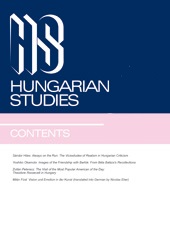Magyar Szemle and the conservative mobilization against Völkisch ideology and German Volksgeschichte in 1930s Hungary
Magyar Szemle and the conservative mobilization against Völkisch ideology and German Volksgeschichte in 1930s Hungary
Author(s): Gergely RomsicsSubject(s): Governance, History of ideas, Political history, Social history, International relations/trade, Interwar Period (1920 - 1939)
Published by: Akadémiai Kiadó
Keywords: Magyar Szemle; völkisch idea; National Socialism; populism; historicism; Hungarian history; conservative revolution;
Summary/Abstract: In the 1930s in Hungary, the periodical Magyar Szemle (Hungarian Review) ranked as the foremost intellectual review of conservative thinking. Edited by the pro-establishment historian Gyula Szekfû, the journal provided important intellectual ammunition to the traditionalists of the right, in other words those who for various reasons sought to hold on to István Bethlen’s version of moderate conservatism in ideology and a parliamentary system of limited pluralism and authoritarian checks in practice. The 1930s, however, bore witness to several challenges to the Horthy regime. The rise of the extreme right and the emancipatory (though often also fervently nationalist) program of the so-called népi (populist or narodniki) writers presented coherent political alternatives to the prevailing order for the first time since the marginalization and emaciation of the left in the wake of the 1918–19 revolutions. Simultaneously, the country had to grapple with the emergence of Nazi Germany as an expansionist great power in the region. In this complicated situation, authors of Magyar Szemle confronted what they perceived as a dual threat: the increasing appeal of German imperialism and German political and historical thinking. Many intellectuals of the time, feeling that the German political challenge should be resisted through the adoption and adaptation of innovative German thinking on politics and history, espoused the new ideologies emanating from the unquestioned cultural center of Central Europe in some form. Magyar Szemle, however, emerged as a hub for public intellectuals who sought to hold on to a conservatism both more traditional and more open to some of the ideas of liberalism and who refused to abandon the established view of Hungarian history for a more ethnically conscious vision of the past. In the context of the dual German challenge of the 1930s, Magyar Szemle represented a site of intellectual resistance not so much against direct German political ambitions but against the new wave of German political thought and interpretations of history.
- Issue Year: 24/2010
- Issue No: 1
- Page Range: 81-97
- Page Count: 17
- Language: English
- Content File-PDF

